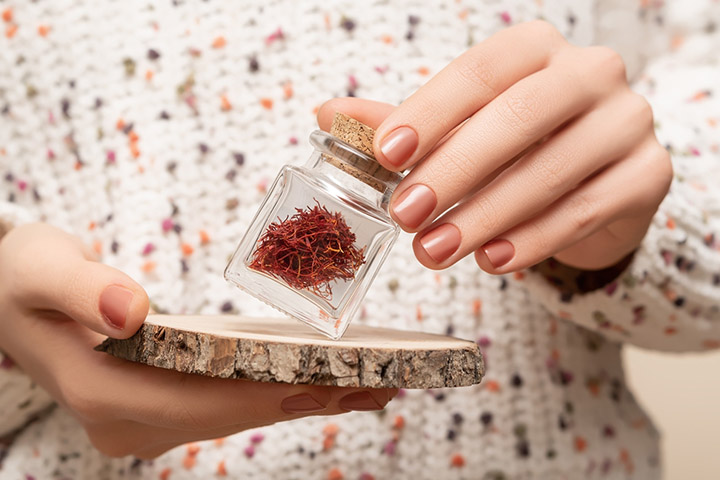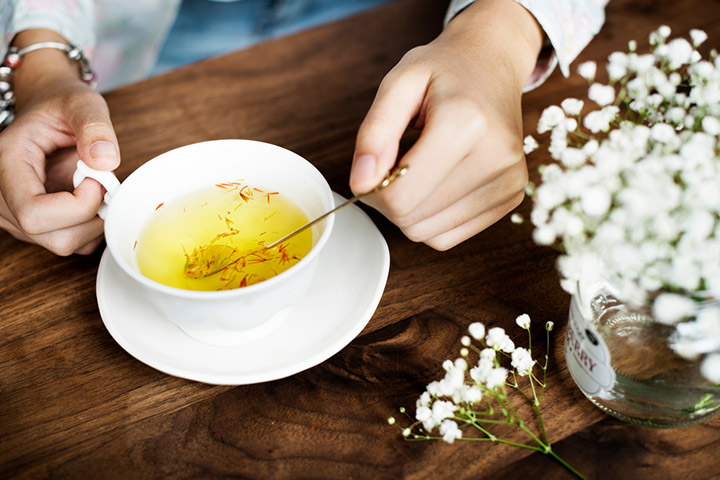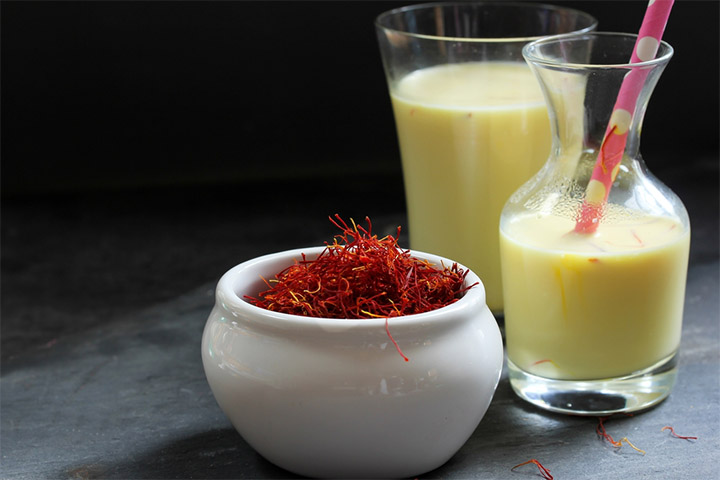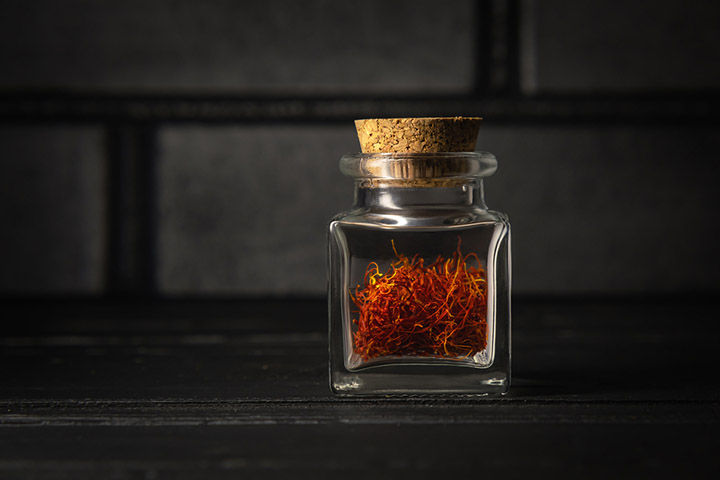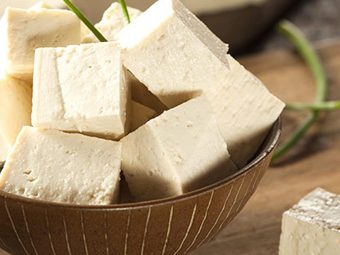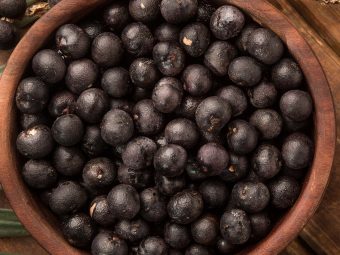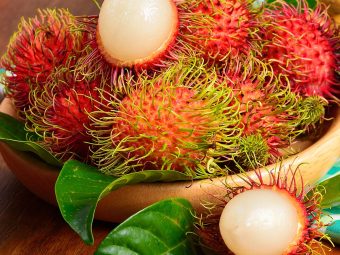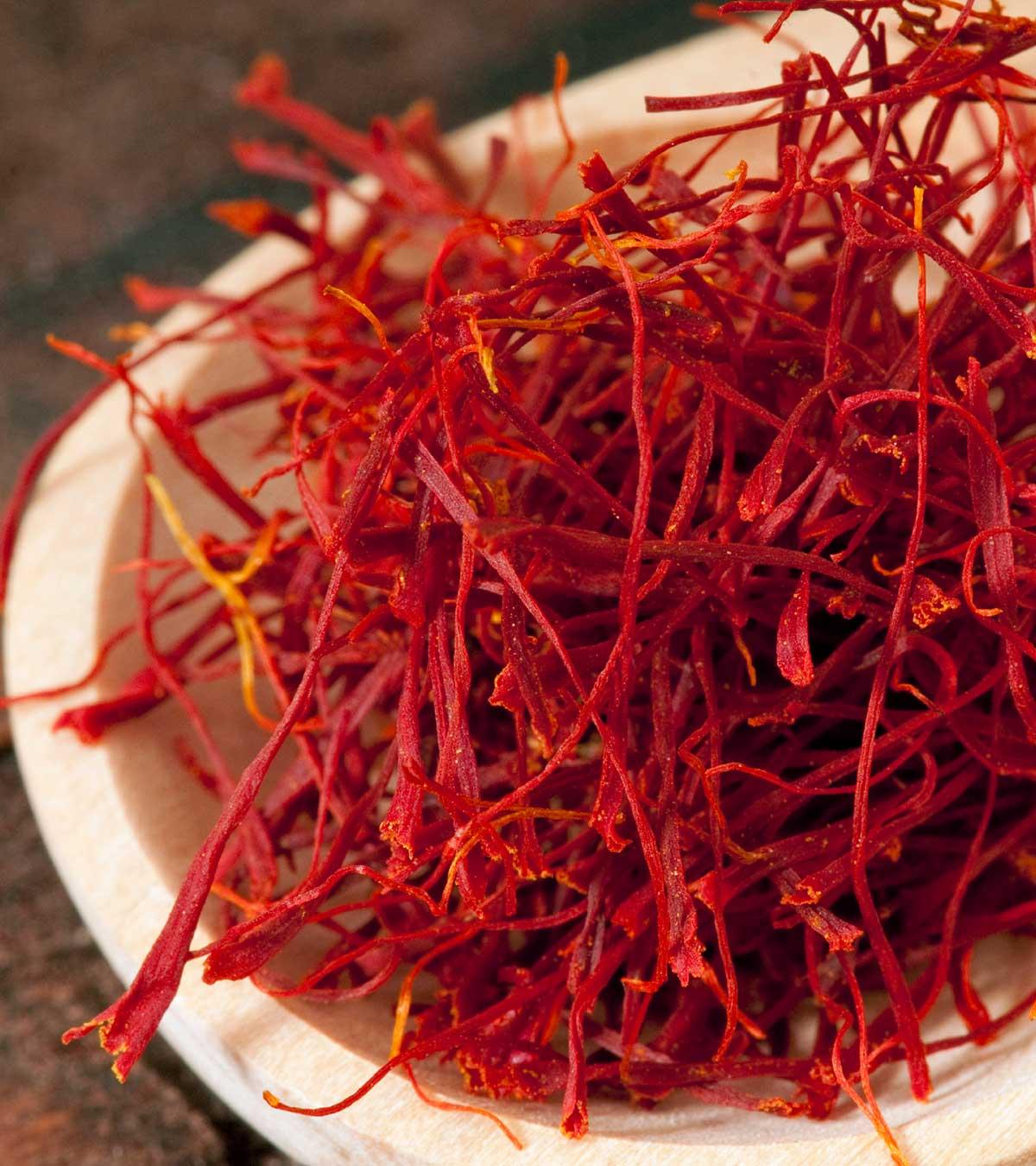
Image: iStock
There is a popular belief that the use of saffron in pregnancy can lead you to have a baby with a fairer skin complexion. This sole reason may seem unconvincing, but are there other scientifically-proven benefits of taking saffron (usually mixed in milk or some other food) when pregnant? Keep reading this post where we discuss the various aspects of consuming saffron during pregnancy, including its benefits, harmful effects, ways to use it safely, and more.
What Is Saffron?
Saffron (Crocus sativus L.) or Kesar is a spice known for its aromatic and flavorful aroma, as well as its medicinal properties. It is a perennial herb that belongs to the Iridaceae family and is mainly grown in Iran and other countries, such as India and Greece. The dried red stigma and a small portion of the flower’s yellowish style are used to make commercial saffron. It has been used as a herbal remedy as per ayurvedic medicine for over 3600 years and is still used in food preparations, opioidiXClass of drugs primarily used for suppressing pain preparations meant for pain relief, and other applications (1).
Is Saffron Safe During All Three Trimesters Of Pregnancy?
Saffron is considered safe during pregnancy, provided you take it in a small quantity. According to the Drug Information Database, exposure to saffron in excessive amounts could lead to uterine contractions, thrombocytopeniaiXDeficiency of blood platelets , bleeding, and abortion (1).
Moreover, it is advised to avoid consuming saffron during the first trimester of pregnancy, when the womb has not yet stabilized. A small study found an increased risk of miscarriage during early pregnancy in women who worked in saffron fields (2). Therefore, try to avoid consuming saffron in excess and during early pregnancy.
Is Saffron Extract Safe During Pregnancy?
Image: Shutterstock
Saffron extract is highly concentrated. In some Asian countries, it is used as a supplement for depression, weight loss, burning fat, and reducing sugar cravings. However, there is no scientific research on how safe the use of the extract is during pregnancy. Therefore, it is better to avoid the extract as it usually has high concentrations of crocin and safranal.
When Can You Take Saffron During Pregnancy?
There is no specific directive for when you may have saffron in pregnancy. Alternative medical practitioners believe that expectant mothers may take saffron during the second trimester, preferably from the fifth month — the time when the baby starts moving in the womb. Also, the pregnancy gets stable by then.
How Much Quantity Of Saffron Is Safe During Pregnancy?
Pregnant women may keep saffron intake between 0.5 and 2 grams per day after the first trimester. It includes all forms and food sources of saffron. Research indicates that an intake within the safe limit might promote uterine elasticity for facilitating labor. A higher intake might have side effects (3) (4).
Does Saffron Have Benefits During Pregnancy?
Image: Shutterstock
When consumed in small quantities, saffron is believed to have some benefits during pregnancy in traditional medicine, owing to its medicinal properties.
- Digestion: A survey published in the Iranian Journal of Basic Medical Sciences in 2013 has found that the astringentiXSubstances with the property of drawing fluid and causing contraction of skin cells and body tissues properties in saffron help cleanse the digestive tract, improve the blood flow, increase appetite, and support digestion (5) (6).
- Blood pressure: A study done on rats has found that the components, including crocin and safranal, in saffron have properties that might control the increase in blood pressure (7). It may, therefore, reduce blood pressure during pregnancy.
- Pains and cramps: Your muscles and bones stretch to accommodate the growing baby. This might cause cramps and pain in the joints and stomach. The anti-spasmodiciXA medication’s property to suppresses muscle spasms and anti-inflammatory properties could help soothe these cramps (8) (9).
- Sleep: Some women who find it difficult to get good sleep during pregnancy use saffron to feel relaxed and sleep well. Saffron’s sedative and hypnotic properties are believed to help in such cases (10).
Saffron intake has been shown to increase sleep quality. As the graph below depicts, the insomnia severity index (ISI) reduced significantly upon saffron administration compared to the placebo group. A statistical reduction in ISI was observed over 28 days compared to the placebo group.
Change in insomnia severity after saffron treatment
Source: Effects of saffron on sleep quality in healthy adults with self-reported poor sleep: a randomized, double-blind, placebo-controlled trial; Journal of clinical sleep medicine- Mood enhancement: Anxiety amongst mixed emotions are common during pregnancy. Saffron is known to be an anti-depressant (1) and could help in elevating your mood.
- Heart health: The antioxidant and anti-inflammatory properties of saffron might help keep cholesterol levels under control and maintain the health of arteries and blood vessels (11).
- Facilitate labor: Saffron is known to affect uterine contractions. This is believed to help in cervical ripeningiXProcess of softening and opening of the cervix before the initiation of labor and might ease labor when taken during labor (12).
- Reduce hair fall: The antioxidant properties of saffron may aid in the prevention of hair loss, the promotion of healthy hair growth, and the repair of damaged hair. It is a key ingredient in a variety of hair oil products. However, insufficient scientific evidence exists to support these benefits.
- Relieves morning sickness: There is some anecdotal evidence that saffron-infused tea can help alleviate severe morning sickness during pregnancy.
 Quick fact
Quick factMany of these benefits might be derived from saffron spice rather than its extract or flavoring often used in food items. Nevertheless, more research is needed to definitively establish the effects of saffron during pregnancy.
What Are The Side Effects Of Saffron During Pregnancy?
Saffron can put fetal and maternal health at risk when you take it in excessive quantities and may lead to complications, such as
- Premature labor or abortion: Animal studies indicate that excess intake of saffron may increase body heat and might lead to premature labor, preterm birth, or abortion (13).
- Fetal malformations: Excess saffron consumption during pregnancy can impair fetal development and cause a variety of fetal malformations or birth defects, most notably skeletal malformations (14).
- Other effects: Some women may experience bleeding, nausea, vomiting, and diarrhea when consuming too much saffron (1).
People use saffron in minimal quantities due to its toxicity, as well as the exorbitant cost. However, it might be consumed in multiple ways.
Is It Safe To Drink Saffron Milk During Pregnancy?
Image: Shutterstock
Saffron milk is a popular way for pregnant women to consume saffron along with milk nutrition. Drinking saffron milk during pregnancy or adding this spice to different dairy products is safe since it only uses a few strands of saffron.
How To Prepare Saffron Milk?
You may coarsely crumble 1-2 saffron stigmas, add them to warm milk, and stir thoroughly before consumption. You may also soak the threads in water or milk for about 10-15 minutes and then pour in the glass of milk.
 Quick tip
Quick tipWhat Are The Other Ways To Consume Saffron During Pregnancy?
Image: IStock
Here is how you may try consuming saffron other than milk. But talk to your doctor before making saffron a part of your prenatal care plan (15).
- A strand or two of saffron can be added to soups, rice preparations, or desserts.
- It is used as a food coloring agent for many dishes, including PulaoiXA type of pot rice dish and BiryaniiXA mixed rice dish that includes rice, vegetables, and meat .
- You may add one or two strands of saffron stigma or its extract to tea.
There are two most common methods of processing saffron before adding them to food items.
- Soaking: The threads are crushed in a mortar and pestle and put in warm milk or water. It is infused for about 10 to 15 minutes and then added to milk or any recipe.
- Crumbling: The threads are crumbled with fingers and added to any preparation.
Additionally, there are also herbal and dietary supplements available in the market that contain saffron extract.
How To Choose And Store Saffron?
Image: Shutterstock
Use these tips to choose and store saffron:
- Since it is one of the expensive spices and herbs, you may get several adulterated varieties of saffron. Buy from a well-known brand or store that has government-approved quality trademarks.
- Check the label, manufacture, and expiry dates.
- Pure saffron is crimson with a soft orange-red tip. The highest-grade variety has a deep color. Adulterated types might look completely crimson and have white or yellow threads.
- Store in an airtight container and put in a dark place. This way, its taste and fragrance remain for some months.
- You can also wrap it in foil, put it in an airtight container, and refrigerate it.
What Are Some Alternatives To Saffron?
You may consider alternatives such as red raspberry leaf, ginger, and peppermint (16). These can be consumed by preparing their tea, and they are considered safe for pregnant women, helping manage nausea and bloating (17). Red raspberry leaf is even believed to improve uterine health and reduce labor pains. Do note that some of these herbs may not be suitable if you are allergic to certain herbs or have food allergies in general. They may also react with certain medications. Therefore, consult your doctor to know about any risks of consuming these herbs and find the right amount safe for you and your baby.
 Quick fact
Quick factFrequently Asked Questions
1. Can saffron change my baby’s skin tone?
Some people believe that consuming saffron during pregnancy makes the baby fairer (18). However, there is no scientific backing to this claim.
2. Can large amounts of saffron cause miscarriage?
Research suggests that a large amount of saffron stigma, as high as five grams per day, may stimulate uterine contraction, increasing the risk of miscarriage in the first and second trimesters (19).
3. Can I drink saffron water every day?
It is normally safe to eat small amounts of saffron in the form of saffron water on a regular basis. However, it is always recommended to speak with a medical expert before making any significant dietary or supplementation changes (22). Saffron may interact with some medications and not be safe for some individuals, including those who are pregnant or nursing.
4. Is saffron good for female fertility?
Studies have proven that saffron aids in the treatment of medically induced sexual dysfunctions in men and women, thereby increasing their libido and sexual satisfaction (23).
There is no doubt that the medicinal and flavorful spice saffron enhances the taste and appearance of any dish it gets added to. However, if you are considering consuming saffron in pregnancy, there needs to be some caution to avoid unfortunate outcomes such as early delivery or abortion. You must not exceed the recommended quantity while including it in your regular diet to safely reap its health benefits such as proper digestion, improved heart health, sleep, and more. Before using saffron during pregnancy, remember to consult your doctor to know its safety and prevent any adverse effects.
Infographic: Advantages And Safety Advice For Saffron During Pregnancy
Saffron is considered safe to consume while pregnant but under certain conditions. The spice can be a great addition to many dishes and desserts for flavor and color. The infographic below presents notable health benefits of saffron for pregnant women and safety tips to consider. Illustration: Momjunction Design Team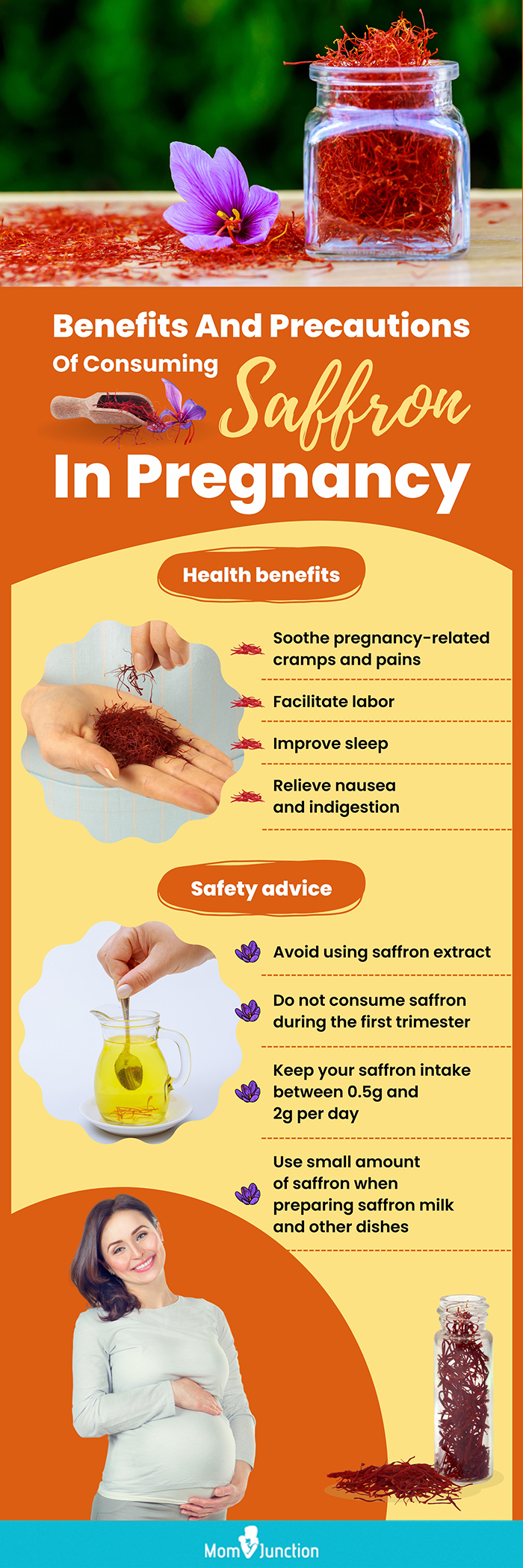
Key Pointers
- Saffron has numerous potential health benefits, including improved digestive and cardiovascular health. It may also relieve pain and enhance mood.
- Despite its health benefits, pregnant women must consume 0.5-2 grams of saffron per day after the first trimester.
- Excess saffron consumption may increase the risk of miscarriage and other congenital anomalies.
- Buy only high-quality saffron with quality trademarks approved by the government.
References
- Mohammad J. Siddiqui et al.; (2018); Saffron (Crocus sativus L.): As an Antidepressant.
https://www.ncbi.nlm.nih.gov/pmc/articles/PMC6266642/ - Mahmoud Ajam et al.; (2014); Increased Miscarriage Rate in Female Farmers Working in Saffron Fields: A Possible Effect of Saffron Toxicity.
https://apjmt.mums.ac.ir/article_3047.html - Roghaieh Sadi et al.; (2016); Effect of Saffron (Fan Hong Hua) On the Readiness of The Uterine Cervix In Term Pregnancy: A Placebo-Controlled Randomized Trial.
https://www.ncbi.nlm.nih.gov/pmc/articles/PMC5285732/ - Sample records for saffron crocus sativus.
https://www.science.gov/topicpages/s/saffron+crocus+sativus#:~:text=avoided%20in%20pregnancy%20owing%20to%20its%20uterine%20stimulation - Behjat Javadi et al.; (2013); A Survey on Saffron in Major Islamic Traditional Medicine Books.
https://www.ncbi.nlm.nih.gov/pmc/articles/PMC3637900/ - Mansoureh Gorginzadeh and Mansoureh Vahdat; (2018); Smooth muscle relaxant activity of Crocus sativus (saffron) and its constituents: possible mechanisms.
https://www.ncbi.nlm.nih.gov/pmc/articles/PMC6235659/ - Zohreh Nasiri et al.; (2015); Dietary saffron reduced the blood pressure and prevented remodeling of the aorta in L-NAME-induced hypertensive rats.
https://www.ncbi.nlm.nih.gov/pmc/articles/PMC4764118/ - Amin Mokhtari-Zaer et al.; (2015); Smooth muscle relaxant activity of Crocus sativus (saffron) and its constituents: possible mechanisms.
https://www.ncbi.nlm.nih.gov/pmc/articles/PMC4599118/ - Hossein Hosseinzadeh; (2014); Saffron: A Herbal Medicine of Third Millennium.
https://www.ncbi.nlm.nih.gov/pmc/articles/PMC3957135/ - Sasan Andalib et al.; (2011); Sedative and hypnotic effects of Iranian traditional medicinal herbs used for treatment of insomnia.
https://www.ncbi.nlm.nih.gov/pmc/articles/PMC5611612/ - Maryam Kamalipour and Shahin Akhondzadeh; (2011); Cardiovascular Effects of Saffron: An Evidence-Based Review.
https://www.ncbi.nlm.nih.gov/pmc/articles/PMC3466873/ - Hasan Badie Bostan et al.; (2017); Toxicology effects of saffron and its constituents: a review.
https://www.ncbi.nlm.nih.gov/pmc/articles/PMC5339650/ - Roghaieh Sadi et al.; (2016); Effect of Saffron (Fan Hong Hua) On the Readiness of The Uterine Cervix In Term Pregnancy: A Placebo-Controlled Randomized Trial.
https://www.ncbi.nlm.nih.gov/pmc/articles/PMC5285732/ - Ahmad M. Eid and Nidal Jaradat; (2020); Public Knowledge Attitude and Practice on Herbal Remedies Used During Pregnancy and Lactation in West Bank Palestine.
https://www.ncbi.nlm.nih.gov/pmc/articles/PMC7034419/ - Keith W. Singletary; (2020); Saffron Potential Health Benefits.
https://journals.lww.com/nutritiontodayonline/Fulltext/2020/11000/Saffron__Potential_Health_Benefits.9.aspx - Herbs and Pregnancy
https://americanpregnancy.org/healthy-pregnancy/is-it-safe/herbs-and-pregnancy/ - Herbal teas during pregnancy and breastfeeding
https://www.pregnancybirthbaby.org.au/herbal-teas-during-pregnancy-and-breastfeeding - Sreetama Chakrabarti and Abhik Chakrabarti; (2019); Food taboos in pregnancy and early lactation among women living in a rural area of West Bengal.
https://www.ncbi.nlm.nih.gov/pmc/articles/PMC6396620/ - Anna Poma et al.; (2012); Anti-inflammatory properties of drugs from saffron crocus.
https://pubmed.ncbi.nlm.nih.gov/22934747/ - Hamid Rigi et al.; (2021); Dermoprotective Effects of Saffron: A Mini Review.
https://pubmed.ncbi.nlm.nih.gov/34544335/ - Detect adulteration with rapid test.
https://eatrightindia.gov.in/dart/ - Mohammad Reza Khazdair et al.; The effects of Crocus sativus (saffron) and its constituents on nervous system: A review
https://www.ncbi.nlm.nih.gov/pmc/articles/PMC4599112/ - Ladan Kashani et al,; Saffron for treatment of fluoxetine-induced sexual dysfunction in women: randomized double-blind placebo-controlled study.
https://pubmed.ncbi.nlm.nih.gov/23280545/





